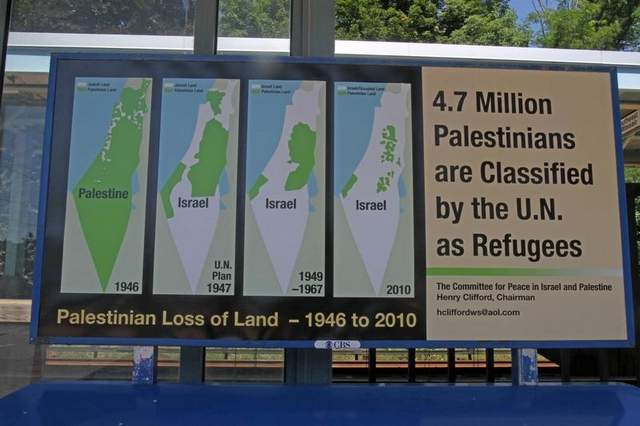In October 2013, the Massachusetts Bay Transportation Authority (MBTA), which provides public transportation throughout Massachusetts, including to millions of riders in the Greater Boston area, accepted for display on its advertising space an anti-Israel, pro-Palestinian advertisement that appeared on approximately 80 posters throughout the transit system. That advertisement depicted four maps that purport to show “the Palestinian loss of land” to Israel between 1946 and 2010. Text accompanying the maps says: “4.7 million Palestinians are Classified by the UN as Refugees.”

After receiving a rash of complaints, on October 31, 2013, the MBTA removed all of the anti-Israel advertisements from the MBTA’s advertising space. However, the very next day, the MBTA, citing a “miscommunication” with its advertising agent, reversed its decision and agreed to repost the advertisements.

Shortly afterwards, Pamela Geller, Robert Spencer, and their organization, the American Freedom Defense Initiative (AFDI), submitted a proposed advertisement that supported Israel in the debate over the Israeli / Palestinian conflict. The advertisement stated: “In any war between the civilized man and the savage, support the civilized man. Support Israel. Defeat jihad.”
Despite permitting the anti-Israel advertisement, the MBTA officially rejected ADFI’s pro-Israel advertisement on Monday, November 4, claiming that the advertisement was “disparaging” and “demeaning.”
As a result, on November 6, 2013, the American Freedom Law Center (AFLC) filed a federal civil rights lawsuit in the United States District Court for the District of Massachusetts against the MBTA for rejecting the proposed pro-Israel advertisement.
As AFLC argued in its complaint, the MBTA’s acceptance of advertisements that specifically address the hotly debated Israeli / Palestinian conflict, and in particular, its acceptance of the anti-Israel advertisement, clearly demonstrate that the advertisement space was appropriate for AFDI’s message. Thus, by censoring AFDI’s advertisement, the MBTA violated the First Amendment.
On November 12, AFLC filed a motion for a preliminary injunction and accompanying brief, requesting that the court order the MBTA to display the pro-Israel advertisement.
CASE UPDATE (November 27, 2013): The court granted AFLC’s motion requesting leave to file a reply brief.
CASE UPDATE (December 6, 2013): AFLC filed a supplemental authority memo, as ordered by the judge.
CASE UPDATE (December 30, 2013): AFLC filed a notice of appeal to the U.S. Court of Appeals for the First Circuit, seeking review of the lower court’s ruling that denied AFLC’s motion for a preliminary injunction.
CASE UPDATE (February 7, 2014): AFLC files a second federal lawsuit after the MBTA rejected a new advertisement submitted by AFDI.
CASE UPDATE (February 7, 2014): AFLC files a motion for a preliminary injunction requesting that the court order the MBTA to run the advertisement.
CASE UPDATE (February 27, 2014): AFLC a reply brief in support of its motion for a preliminary injunction.
CASE UPDATE (June 16, 2014): AFLC filed its opening brief in the U.S. Court of Appeals for the First Circuit
CASE UPDATE (August 1, 2014): AFLC filed its reply brief in the U.S. Court of Appeals for the First Circuit.
CASE UPDATE (October 6, 2014): AFLC Co-Founder and Senior Counsel Robert J. Muise presented oral argument before the U.S. Court of Appeals for the First Circuit in Boston, Massachusetts.
CASE UPDATE (April 13, 2015): On March 30, 2015, a divided First Circuit panel (2 to 1) upheld the MBTA’s speech restriction. On April 13, 2015, we filed a petition for rehearing en banc, asking the full court to review the case.
CASE UPDATE (April 29, 2015): The First Circuit denied our petition for rehearing en banc, with one judge dissenting.
CASE UPDATE (July 27, 2015): AFLC filed a petition for a writ of certiorari in the U.S. Supreme Court, asking the high court to review the case.
CASE UPDATE: The Supreme Court denied cert. Case closed.
